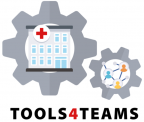Recruiting organisation: University of Zurich, Switzerland
Supervisor: Prof. Jan Schmutz
Doctoral Candidate: Arndt Pool
Secondments: LMU Munich, Germany (3 months); Copenhagen Academy for Medical Education and Simulation (CAMES), Denmark (3 months)
Summary: Debriefings or after-action reviews after clinical cases or as part of team trainings using medical simulation approaches have gained increased attention in the last decade. Researchers and practitioners agree that debriefings are a valuable tool to foster learning, improve teamwork and ultimately increase patient safety. In this PhD project the DC will develop and validate a behaviour anchored rating scale (BARS) to assess reflection quality during debriefings. To achieve this goal qualitative and quantitative methodologies will be applied using interviews with debriefing experts and structured behavioural observation and analysis of debriefing discussions.
Background
Debriefings or after-action reviews after clinical cases or as part of team trainings using medical simulation approaches have gained increased attention in the last decade. Researchers and practitioners agree that debriefings are a valuable tool to foster learning, improve teamwork and ultimately increase patient safety. The goal of a team debriefing is to foster team reflection as an essential team process. Participants are encouraged to look back and review what has been done, collectively evaluate actions and goals by identifying areas for improvement and looking forward by formulating key actions that will be implemented in the future. Various approaches exist to conduct debriefings (e.g., guided vs. unguided, structured vs. unstructured). A debriefing discussion is a highly dynamics process. Therefore, it is challenging to define what behaviours during a debriefing determine if a debriefing is effective. The overall goal of this project is to define and investigate the quality of reflection during a debriefing and develop a tool that will allow participants and training instructors to evaluate the reflective quality of a team discussion during a debriefing.
Approach
This project will focus on the development and validation of a behaviour anchored rating scale (BARS) to assess reflection quality during debriefings. To achieve this goal qualitative and quantitative methodologies will be applied using interviews with debriefing experts and structured behavioural observation and analysis of debriefing discussions. The first step will include the development of the tool. In the second step, the tool will be applied and validated. Therefore, we are interested in the relationship between reflection quality (measured with the tool) and learning and performance outcomes. Third, the tool should be implemented in real-life settings using a smartphone or a tablet to help debriefing instructors to evaluate the reflective quality of their teams and assist the debriefing discussion. The candidate will be part of an international network of PhD students funded by the Marie Skłodowska-Curie Actions (MSCA) of the European Union’s “Horizon Europe 2022”.
Our research team
The Applied Team Research group consists of behavioral scientists investigating teams that often deal with extreme or adverse events (e.g., healthcare teams, military teams) and teams working and living in extreme contexts like Antarctica. To reach our goals, we conduct internationally recognized studies applying a multi-method approach. We observe teams in the field and experimental settings using quantitative and qualitative research methods.
During the project, it is expected to visit our partner organizations Copenhagen Academy for Medical Education and Simulation (CAMES), Denmark, and Ludwig Maximilian University Munich (LMU), Germany. The short stays will be used to broaden the candidate’s network and assess data.
University of Zürich
The UZH is one of Switzerland’s leading research universities with excellent working conditions. With its 28,000 enrolled students, the University of Zurich (UZH) is Switzerland’s largest university. Founded in the year 1833, UZH was Europe’s first university to be established by a democratic political system; today, UZH is one of the foremost universities in the German-speaking world. Made up of seven faculties covering some 100 different subject areas, the University offers a wide variety of Bachelor’s, Master’s and PhD programs.
